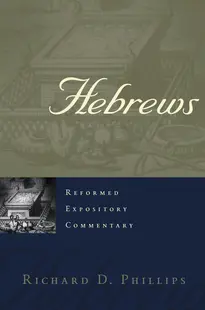

Hebrews
in Reformed Expository Commentary
Pages
670
Publisher
P&R Publishing
Published
2006
ISBN-13
9780875527840
“Few studies can be more profitable to Christians today than that of the Epistle to the Hebrews,” says Richard Phillips. “Written . . . to a group of Jewish Christians facing persecution in the mid-first century A.D., the words of this book speak to Christians everywhere about standing firm in Jesus Christ.”
Hebrews captures the challenges and pitfalls of people throughout the ages and shows both why and how to press on in the faith. Its message of warning and hope centers on the surpassing supremacy of Jesus, seen often from the vantage point of the Old Testament.
In keeping with the Reformed Expository Commentary series, this treatment of Hebrews is accessible to both pastors and lay teachers. Each volume in the series provides exposition that gives careful attention to the biblical text, is doctrinally Reformed, focuses on Christ through the lens of redemptive history, and applies the Bible to our contemporary setting.
Hebrews captures the challenges and pitfalls of people throughout the ages and shows both why and how to press on in the faith. Its message of warning and hope centers on the surpassing supremacy of Jesus, seen often from the vantage point of the Old Testament.
In keeping with the Reformed Expository Commentary series, this treatment of Hebrews is accessible to both pastors and lay teachers. Each volume in the series provides exposition that gives careful attention to the biblical text, is doctrinally Reformed, focuses on Christ through the lens of redemptive history, and applies the Bible to our contemporary setting.
Reviews
The several differences between this commentator and the reviewer offer an unusual chance for a hermeneutical encounter. The commentary I was invited to review is written by an American scholar, doctrinally Reformed, who addresses preachers and teachers of his church, combining biblical Christology, redemptive history, and contemporary practice, all in an emphatic and empathic way. For my part, I have been socialized in the rather dispassionate traditions of European historical criticism. I take interest in the historical matrix of the letter to the Hebrews. Nevertheless, as a theologian and a Roman Catholic priest, I also stress Hebrews’ christological meaning and look for ways to discuss it in modern contexts of both pastoral ministry and hermeneutical reflection. Such differences between author and reviewer may be exegetically productive. Given the appreciation that John Calvin showed toward Hebrews, in particular for its explications on the priesthood of Christ and its Christ-centered dealing with the Old Testament, one may wonder how this epistle could fall into neglect in the proclamation and life of Reformed churches, as Richard B. Gaffin Jr. deplores on the book jacket. At any rate, Phillips, who has also written a commentary on the prophet Zechariah in the same series, does a lot to fill this gap. The commentary is directed to a popular audience. Its explanatory style is influenced by the pulpit and is aimed to influence the pulpit.
[Full Review]
